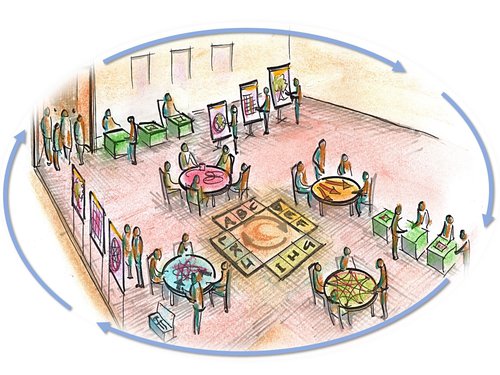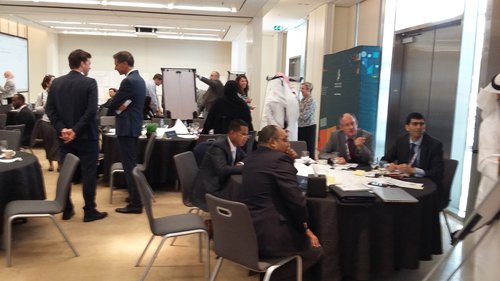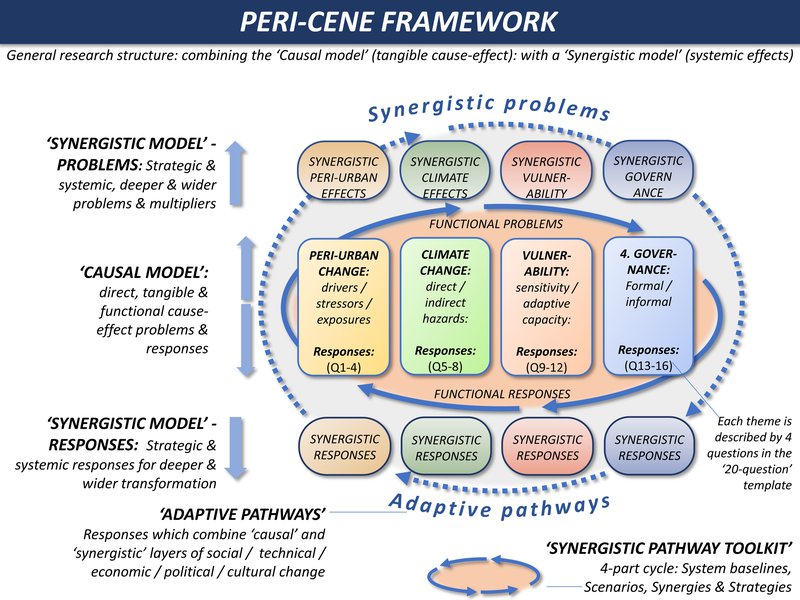At the centre of the Peri-cene project is the international ‘Policy Laboratory’. This is a space for collaborative working on the -
(a) diagnosis / mapping of problems,
(b) design of responses and ‘adaptive pathways’.
Activities & resources include:
- Interviews & dialogues with partners
- International workshop in mid-2021 (Stockholm / online);
- Peri-cene Analysis Tool ( P-CAT) for spatial mapping of urban / climate interactions;
- Peri-cene Pathways Tool: for system mapping of problems & forward pathways.
The output will be an online resource library, with policy reports and academic papers.
The outcome aims at new insights on peri-urban / climate interactions, both in the problems and responses. This includes an outline global assessment, and in a set of ‘adaptive pathways’ in each of the partner city-regions. Alongside we develop a practical framework and toolkit, to help prepare and set up more detailed studies in the future.
The Policy Lab was launched on 29-01-21, see materials & recordings on -

The general approach follows the Synergistic toolkit
The Policy Lab program stages include:
- Jan 2021: launch of Policy Lab and platform: includes partner profiles & baseline analysis:
- Jan-March: phase 1a: first interview program for the policy-lab database, for the ‘causal model’: we follow the ’20-questions’ template with spatial analysis.
- April-June: phase 1b: follow-up interviews on systemic & indirect problems, for the ‘Synergistic Model’, with scenario analysis.
- July: phase 2: international Pathways Workshop: Stockholm and/or online, depending on the Covid-19:
- Aug-Sept: phase 2 interviews continue on adaptive pathways:
- Oct-Nov: synthesis of adaptive pathways: final reports & dissemination materials: prepare for follow-up research.
NOTE - The COVID-19 situation has caused major delays to the program, which now runs to 30th November 2021.

Who is in the Policy Lab?
- 16 city-regions are signed up Partners: Melbourne, Changsha, Surabaya, Bangkok, Cairo, Johannesburg, Kumasi, Naples, Helsinki, Belo Horizonte, Toronto, San Diego, and Mexicali (along with the major case studies in Chennai & Manchester region)
- Associated partner city / regions also include: Victoria (AU), Tokyo, Guangzhou, Dhaka, Doha, Moscow, Granada, Stockholm and Santiago.
- The partners and associated partners are supported by three inter-governmental organisations: UN Habitat, UN Global Cities Compact, and ICLEI (International Council for Local Environmental Initiatives). Many of the partners are also members of the Rockefeller 100 Resilient Cities community.
Together, these Partners represent the major urban types and climate risk types, from both developing ('urban South') and developed countries ('urban North').
More information on the Lab and how it works is on the Policy Lab Summary
For full detail and a 'worked example' see the first stage report - D3-1 - Policy Lab outline
Policy-Lab partners
The partner city-region pages are being posted here, as & when the material is ready.
Each of these is a pilot version, which will grow over time to a full set of pages -
- ‘resource page’: shortlist of policy reports & academic papers, to be checked with local knowledge.
- ‘mapping page’: results from the global mapping, together with any local maps.
- ‘pathways page’: 20 question template on peri-urban / climate risk: with synergistic co-design of adaptive pathways.
Melbourne
Tokyo
Changsha
Guangzhou
Surabaya
Bangkok
Dhaka
Doha
Cairo
Johannesburg
Kumasi
Helsinki
Stockholm
Naples
Granada
Toronto
San Diego
Santiago
Mexicali
Belo Horizonte
3 main international organizations are also involved: -
ICLEI
UN Cities programme
UN Habitat
SOURCES for the following city-region pages include:
- Climate-environment hazards: World Bank database on Think Hazard portal
- Indices: region / province level data where available, otherwise national.
- Governance indices: generally national level data from composite indicator libraries:
- BTI = Bertelsmann Transformation Index
- SPI = Social Progress Index
- WGI = World Governance Index
Peri-cene Framework
Each of these city-region case studies uses the Peri-cene Framework (for detail see the D1-2 - Pericene Framework. This starts with the 4 key themes:
- peri-urban and spatial development;
- climate change hazards and impacts;
- vulnerabilities, both physical, social and economic;
- governance, both formal, informal and collaborative.
These 4 key themes are covered in summary, by the '20-questions' template, in each of the case studies.
The Framework also includes 2 main 'Models', different levels of analysis:
- CAUSAL MODEL: shows (as far as possible) tangible & functional cause-effect problems & responses
- SYNERGISTIC MODEL: shows (as far as possible), Strategic, systemic, deeper & wider chains & multipliers, first in the problems, and then in the responses.
The combined responses from both Models then form the 'adaptive pathways' - combinations of governance, social, technical, economic and cultural change.

